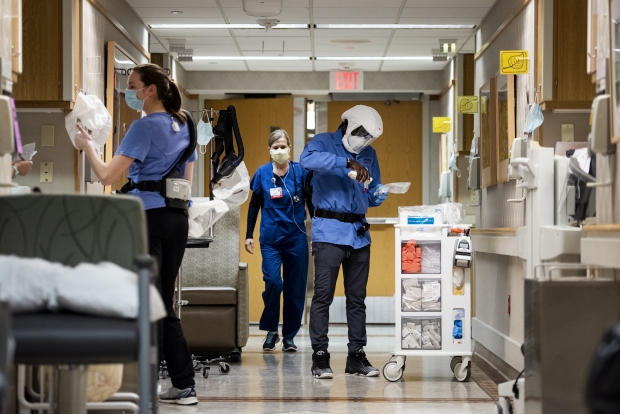Studies Link Obesity and Severe COVID-19
And 67% of Wisconsin adults are obese or overweight, state data shows.

Healthcare workers pass through the hallway of a COVID-19 unit Tuesday, Nov. 17, 2020, at UW Hospital. Angela Major/WPR
For most people in Wisconsin, it will be late spring or early summer before they can be vaccinated against COVID-19.
In the meantime, public health officials continue to drive home the need to continue wearing masks and taking other pandemic precautions.
He gave a virtual presentation Wednesday to a state business lobbying group, Wisconsin Manufacturers and Commerce, on the economy and public health.
Green’s answer came in response to a question about additional ways to protect oneself against COVID-19 beyond what public health officials have repeated throughout the pandemic: cover your nose and mouth, socially distance and wash your hands.
The inquiry was whether boosting one’s immune system through supplements like zinc or vitamin C could help ward off COVID-19 infection.
“We don’t have solid data. There’s lots of recommendations from different people, (but) they haven’t been studied in the context of COVID-19,” Green said. “People think things work but the data behind those interventions from what I’ve read isn’t extensive and not completely convincing.”
Weight As A Risk Factor
It’s not entirely clear why some people infected with COVID-19 don’t get sick and others get very ill or even die.
The elderly and those with certain health conditions have been most severely affected by COVID-19, but a recent study published by the Centers for Disease Control and Prevention shows people who are overweight or obese have a high risk of bad outcomes if they become infected — regardless of age.
“That suggests targeting people for vaccination who may be otherwise healthy but have elevated body mass index (BMI) is certainly appropriate to get them protected as soon as possible,” said Dr. Dawn Davis, an associate professor of endocrinology at the University of Wisconsin School of Medicine.
The latest priority group announced to be eligible for COVID-19 vaccine in Wisconsin under Phase 1c includes anyone 16 and older who has a BMI over 25. It’s expected they will be eligible to get vaccinated beginning March 29.
Listen to the WPR report here.
Studies Continue To Show A Link Between Obesity And Severe COVID-19 Illness was originally published by Wisconsin Public Radio.





















